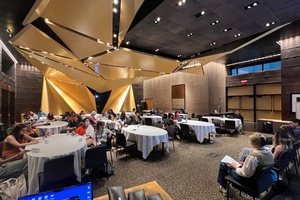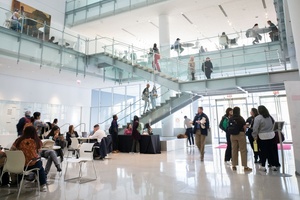Features:
Election Hacking at MozFest
After the 2012 US elections, what’s next?

The second day of the two-day Mozilla Festival in London is dedicated to collaborative making. If the momentum works as it should, the ideas and alliances built on the first day turn into the beginnings of actual things: projects, collaborations, tools, proofs of concept.
On the code-in-journalism front, Knight-Mozilla Open News led a hack session on election-related news apps and tools. About 70 people attended the discussion session that kicked off the event—including developers from Bloomberg News London, the Chicago Tribune, the Financial Times, Guardian News & Media, the Knight News Innovation Lab, the New York Times, NPR, ProPublica, Sourcefabric, the Spokesman-Review, the Times of London, and Ushahidi—and approximately 40 were involved in the hands-on making session that followed it.
The Session

To contextualize the work attendees were about to undertake, working developers from a dozen news organizations broke down the election projects they’d made, the challenges they encountered along the way, and their hopes for future versions. (We’ll be publishing detailed walkthroughs of many of their projects over the next week and a half.)
To make the leap from contextual discussion into actual making, we collectively listed a series of major election-related challenges faced by developers. The challenges, clustered into larger topical areas, formed the basis of the making sprint that followed. Affinity groups formed around specific challenges, and after a 90-minute planning, sketching, and prototyping session, each group reported back on potential solutions ranging from Kenyan election info for feature phones to a browser plugin that tracks your consumption of empty information calories. Below, the teams report back on their progress.
Better Democracy via Mobile Design

Mobile info for the Kenyan elections
Group: Jessica Lord, Brian Boyer, Matias Attwell, Marcus Asplund, Linda Kamau
We worked on mobile-first strategies for providing election information to promote democracy and citizenship (over “news”)—specifically in Kenya, with “mobile” meaning SMS feature phones. In the hack session, we developed an outline of strategies for reaching feature phone users and giving them information such as:
- Where do I vote?
- Who can I vote for?
- What positions are up for election?
- How do I register to vote?
Toward a Slow Politics Movement
Group: Bryan White, Joe Germuska, Larry Birnbaum, Mike Tigas, Jaap Meijers
We want to help citizens improve their information diet. Horserace coverage positions politics as competition, not democracy. The public asks for more information and less fluff. Our goal is to encourage readers to reflect on what political info they consume, and nudge the toward a balanced news diet.
We sketched out a browser plugin that uses server-side text analysis to determine what type of content each article contains, and offers immediate visual feedback on what types of political information you consume, as well as a graph history of your diet by day, week, and all time. We also imagine a periodic email about your diet, with calls to action to get informed.

You are what you…watch
So Many Maps, So Many Results Lists: Reducing Redundancy

Notes against redundancy
The Group: Miranda Mulligan, Aron Pilhofer, Ryan Pitts, Brian Abelson, Dan Hill, Noah Veltman, Marianne Bouchart, Martin Stabe
Why do we all do the same things and not have time to be journalists? Currently, development for elections is too expensive and time-consuming. If we made this easier, we might have time to do analysis and explore context…
An analogy: Political pundits should look at Nate Silver and think to themselves, “hey, I don’t have to worry about covering the horse race, I’m freed up to focus on context and analysis.” That’s what we’re going for here—take care of the maps, charts and lists that are part of obligatory election coverage these days, and free up talented news devs to do visualizations and answer contextual questions.
The Ideal World: Centralized, open data source from the government that’s normalized and updated in real time.
The Actual World:
Tier 1: Platform access to data through API, middleware admin
Tier 2: Libraries for patterns & UI, customizable widgets, educational training, platform plugins
Action plan:
- We do an open callout for libraries and tech contributions (Actual World, Tier 2)
- Someone agrees to be open source project hub—this person manages communication and helps define the community
- The larger group does education and adoption, facilitates future contributions
Phase 1: pattern libraries, widgets etc. This gives us an opportunity to create best-of-breed visualizations
Phase 2: API between existing data (what phase 1 presentation tools need)
Phase 3: Ideal world utopia, swap out data sets
Challenge: Involving Citizen Voices

United in shared annoyance
Group: Grainne O’Brien, Heather Leson, Rob Bole, Stephen Abbott, Finlay Craig
People hate politics, and we want to build trust and ease the flow of information. We worked on connecting communities/citizen voices to media. Key questions included: What does the electorate want? How do media organizations use and verify this information? How do we get viewpoints on viewpoints? How can we connect hyperlocal (Polygons) to topics/metadata that matters to citizens but can be useful to media?
The “Hate Map” tracks the following elements:
- Where you are from (at the level of the neighborhood.
- What you hate about politics.
- Information you should know.
…and it also offers ways of starting conversations on those topics.
Following Up
It’s easy to let the momentum from hackdays and other making events fade away after the sharpies go back in their boxes and the laptops return to their bags, but many of the projects begun today have a future. The teams collaboratively created an Etherpad with their notes, and OpenNews is starting a Google Group for session participants to carry on the conversation and work toward something they can ship. And when they do, we’ll be back with the details.
Thanks to MozFest for having us and to our fantastic attendees for showing up at the first session of the day—and for talking elections while still on the mend from last week’s madness. See you next year!
Organizations
Credits
-
 Erin Kissane
Erin Kissane
Editor, Source, 2012-2018.



